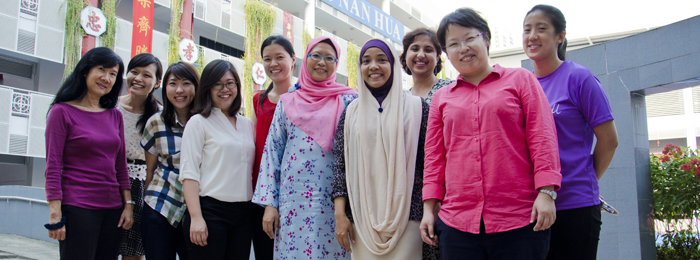Young Children’s Voices in Mathematical Problem Solving
Contributed by Dr Ho Siew Yin and Sng Wei Qin Abbie, from NTUC First Campus, for SingTeach Virtual […]
Read More
The teacher organizers share with us stories of how their students both learned and had fun at the festival that celebrates all things Literature.
Students from Chestnut Drive Secondary School attended the Literature Festival for the first time last year. And it certainly won’t be their last.
“They didn’t know Literature could be so fun!” shares their teacher Ms Michelle Lim. “And they’ve been asking me when they can start preparing for this year’s festival.”
A record number of 82 schools took part in the festival held at Dunman High School last year, compared to just 30 when it first started in 2005.
In the face of a decline in the number of students taking N- and O-Level Literature, the festival organizers find such enthusiasm very promising, because their “mission statement” has always been to keep the flame alive for Literature.
“It’s always been about enthusing students in what Literature is and is about,” says the festival founder, Dr Suzanne Choo from NIE.

Suzanne Choo (second from right) and the team of teachers organizing the Literature Festival
Mrs Rupa Beng Choo, a Literature teacher at Crescent Girls’ School, explains that the Literature Festival aims to bring learning beyond the classroom. Every activity is an opportunity for students to apply what they have learned during their lessons.
“It’s like bringing what they learned in class alive,” she notes. “It’s one way of making learning of Literature exciting!”
For example, students from different schools pitted their knowledge of a literary text against each other in the set-text debate. They not only had to argue for their own stance, but also question their opponents in the rebuttal rounds.
“It gives the students the ability to not only criticize each other but summarize and reiterate for themselves what they have learned,” notes Ms Chong See Hwei from Paya Lebar Methodist Girls’ School (Secondary).
The same goes for the book parade, where students promoted the texts they were studying to their peers from other schools. “It’s another avenue to allow students to express what they know about the text in whatever way they want to put it, be it a poster, using Information Technology or other artefacts. They can even come dressed up as the characters,” Beng Choo explains.
Michelle shares how her students were very worried that they would embarrass themselves because they didn’t spend much on props for the parade. “But they did well!” she says. “Upon reflecting, they realized, ‘Literature is like that – we don’t need the fancy stuff!’ It’s about what you interpret from the text.”
Students who took part in the festival gained a deeper appreciation of Literature. But even more valuable is their experience of interacting and competing with peers from other schools.
The students of Ms Maria Vanderstraaten from River Valley High School first attended a 3-hour workshop on how to write a poem, and then presented their own compositions at the festival.
“We had students who performed in front of total strangers for the very first time in their whole lives,” shares Maria. “At first, they felt very jittery but in the end, they emerged more confident than I had ever seen them.”
Beng Choo agrees and recalls how students from Queenstown Secondary School debated against her students last year and won. “You should’ve seen their thrill and excitement! I think they did a wonderful job. So if you ask me, that kind of encouragement is sometimes better than getting 80 marks in a test.”
For those students who did not win, all is not lost. Ms Grace Kanai from Greenridge Secondary School shares that her students lost a debate last year, but not their spirit of learning.
“They were still enthusiastic, and said they knew why they lost,” she recalls. “They said it wasn’t because they didn’t have the content knowledge. It was because they were not articulate in presenting their arguments, but they would work on it. They were really taken away by the insights of the opposing team.”
Ms Junaidah Abdul Wahab from Nan Hua High School agrees, and thinks it is because the festival provides a safe, informal environment for them, away from grades and pressures.
“Even if they lose, they’ll feel bitter for an hour, and then they’re OK because it’s fun.” she explains. “Also, they made friends with other students from other schools and teased them: ‘I have lesson notes that you don’t have!’”
And through such friendships and interactions, some students start to feel a sense of belonging. Junaidah notes that there are very few Literature classes in her school. Because of that, her students feel like they are a minority group in the school.
“When they went to the festival and realized they were not alone, some of them told me,‘Teacher, we finally see people like us!’” she says.
“The best part is when they come back to school and instead of feeling different, they feel proud of themselves. They announced to their peers that they had fun learning. They now have a Literature identity.”
This year will see the Literature Festival celebrating its 10th anniversary, and the organizing committee hopes more teachers will join their ranks.
“The festival is purely teacher-run and dependent on volunteers,” says Suzanne. “Every year, we’ve more enthusiastic teachers who volunteer to serve out of passion. It’s very encouraging!”
However, she notes that they are always looking out for more schools to offer to host the festival, and for more Literature teachers to serve as judges.
Suzanne’s wish is for all Literature educators in Singapore to see the Literature Festival as their “project”. In the meantime, this group of committed educators continues to keep the flame alive by working together to make the festival bigger and better. And if they had their way, Literature will never become a “sunset subject” in Singapore schools.